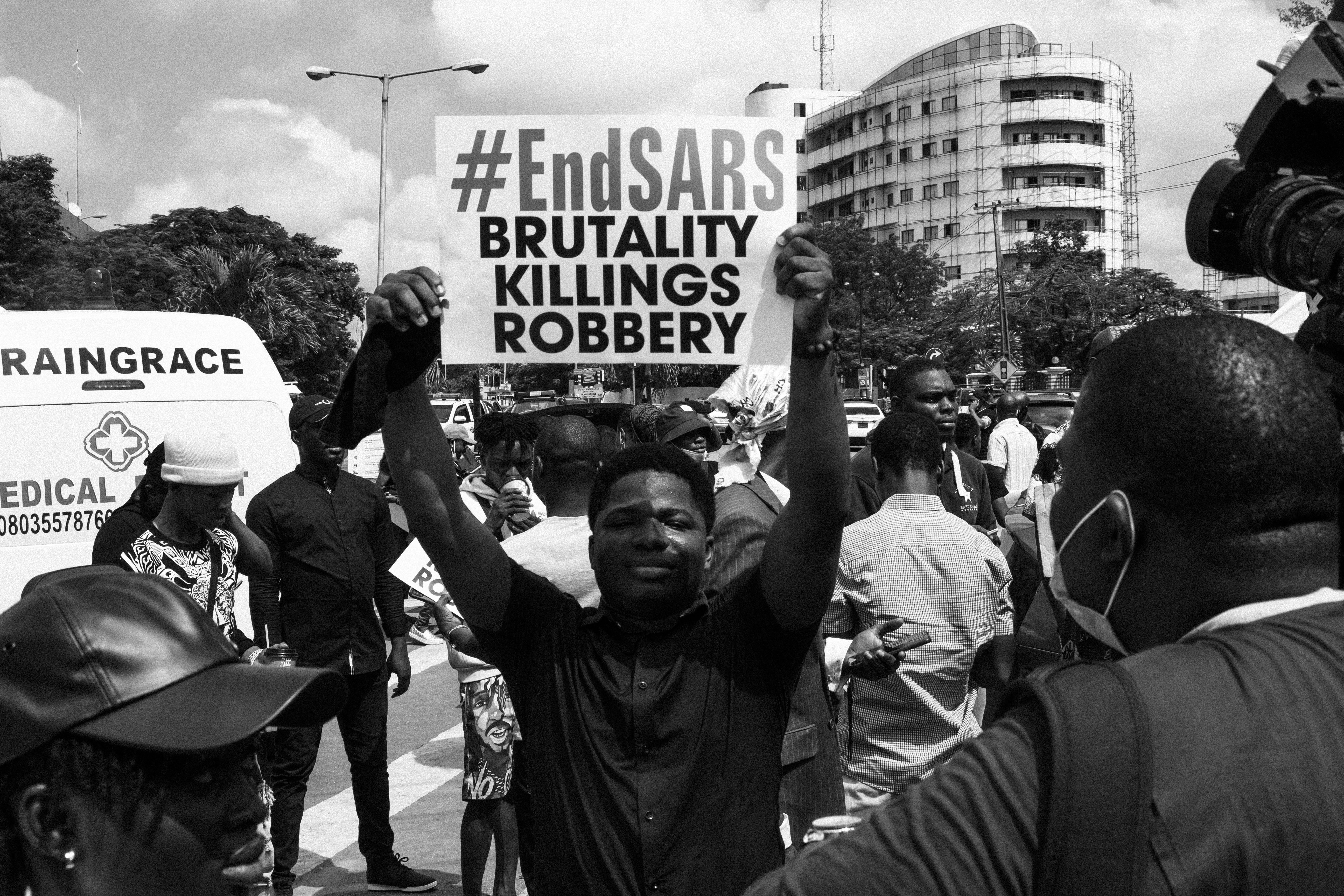The ongoing #EndSARS movement in Nigeria has garnered international attention in recent weeks as youth have taken to the streets in protest against the ongoing violence and brutality at the hands of the specialized police force. These protests have major implications for the nation as a whole but the high level of involvement from feminist organizations offers the possibility for radical social change for both race and gender.
In 1992, Nigerian police squads formed the Special Anti-Robbery Squad unit to focus on more violent crimes such as carjacking, armed robbery, and kidnapping. Given that this was meant to be a covert force, officers were not required to wear uniforms. However, this element of secrecy enabled these ‘undercover officers’ to act violently toward civilians without facing repercussions, and by the early 2000s, they had established a notorious reputation for racially targeted attacks and assaults on unsuspecting people. In fact, Amnesty International reported at least 82 cases of torture, ill-treatment, and extra-judicial execution by SARS between January 2017 and May 2020. In spite of clear reports of acts of unwarranted violence and domestic backlash from the population, Nigerian authorities have failed to prosecute a single officer from SARS.
While protests against this violence have been ongoing since 2017, the movement gained significant momentum following the release of a violent video where SARS officers shot a young man before escaping in his jeep, leaving him dead on the side of the road. The movement quickly garnered international attention through the use of #EndSARS on social media, with numerous celebrities bringing awareness to the international issue. Despite Nigerian youth predominantly being at the forefront of this ongoing movement, feminist organizations, such as the Feminist Coalition, have provided the backbone. Not only has this relatively new organization raised countless funds for the movement as a whole but it has also established a reliable network of support for protestors that includes legal aid, medical support, and even meals. In a nation burdened by colonial legacies that consistently undermine the importance and the role of women in political society, the significance of these contributions from a feminist organization cannot be discounted.
Throughout history, countless women have played major organizational and leadership roles in major social movements. However, their names rarely hold as much historical significance compared to their male counterparts. When people hear the American civil rights movement of the 1960s they think of Martin Luther King Jr, not Ella Baker. This is not a result of lesser contributions on the women’s part but rather reflective of the biased structure of social movements that foster clear gender distinctions and hierarchies. Many of these established hierarchies can be directly attributed to societal gender norms that label men as authoritative leaders while leaving women in the background as the “invisible leaders”. In fact, evidence shows that men are more often associated with the movement’s formal structures such as trade unions and political parties, while women are more commonly seen in the more informal structures that reside at a community level. While women may be responsible for helping to get grassroots movements off the ground, they are commonly left in the shadows as movements grow in size.
The dynamics of this issue become even more important as we move into the international sphere where feminist-led social movements have the opportunity to embody and confront the multiple and simultaneous oppressions felt by women of African descent. While current Western movements against police brutality such as Black Lives Matter have widened the platform for discussing institutional racism, black women’s representation is consistently harmed through the systemic racism and sexism present in many media organizations. Not only does this make it harder for them to gain respect in the political context but effectively undermines any active contributions they have made to the cause as a whole. The intersectionality of these societal issues holds even more significance in Nigeria given the lingering colonial legacies that “build on and [intensify] already existing sexual divisions and indigenous patriarchy”. For this reason, it is of utmost importance that organizations such as the feminist coalition insert themselves into these significant political movements to break down traditional barriers and change the perceptions of African women within society.
Yetunde Omede, a professor of global affairs and politics in New York, noted how the protests are about more than just police brutality. Similar to the Black Lives Movement seen throughout the US, this movement has spurred an “awakening of Gen Y” and will no doubt shape the political landscape and issues covered in the next election seen in 2023. With Nigerian feminist and the Feminist coalition continuing to be at the forefront of this ongoing movement, there is hope for reform and acceptance of not only SARS but also in the status of women throughout Nigerian society.
Edited by Yu Xuan Zhao.
Featured image by Nengi Nelson on Unsplash.
Emily is in her third year at McGill University majoring in Political science with minors in social entrepreneurship and international development.

